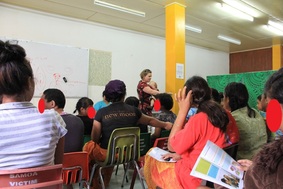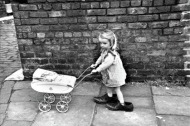 I was privileged to spend some time with some gorgeous girls in Samoa last year. As my blog posting has been sporadic-at-best as of late, this has sat in my 'drafts' way too long! Background In 2013 I was planning a family holiday to Samoa. As someone passionate about social justice, I like to ‘give back’ to the communities I live in and visit. I had helped organised an aid package to go to Samoa Victim Support Group previously, and I thought I may be able to offer a workshop to the girls at their residential shelter. Wellington-based charity SpinningTop connected me to their President Lina and we organised for me to provide a workshop for them. What I Did When we arrived in Apia I met with Lina at the SVSG offices and she gave me more background on their organisation. We discussed what I would be teaching the girls and I gave Lina a couple of boxes of supplies I had brought with me – Air NZ had kindly agreed to transport these for free. The boxes contained some donated stationery items, disposable sanitary pads donated by Kotex, as well as re-usable packs from Days For Girls NZ (containing underwear, cloth pads, and a wash cloth). I spent a morning with approximately 30 girls - the girls were fantastic and really engaged, and the staff were very supportive. The girls were gorgeous, so full of smiles and laughter. They are survivors for whom I have the utmost of respect for. Lina had told me some of their stories, and these girls have all been on traumatic and heartbreaking journeys. Most of them are with SVSG because they are survivors of sexual violence, for many of them this is incest. Many of them have been pregnant as a result of this violence. Tragically in many cases these girls have been disowned and blamed for bringing shame on the family. SVSG provides safety, education and a home for these girls. SVSG also manages the legal process to bring justice for these children. The girls had lots of questions and I felt like we could have spent a lot more time together. The level of knowledge and understanding of how their bodies work was very low. Most knew very little about the menstrual cycle, pregnancy and childbirth - despite there being pregnant girls and girls who had already birthed in the group. My (then 10 month old) daughter Nina accompanied me and I found that having her there was a good ‘icebreaker’ with the girls. The girls enjoyed chatting and playing with Nina as they warmed up to me. As it turned out Nina ended up sleeping in my front-pack for most of the morning as I taught - it was more than 30 degrees in the classroom so we were rather sweaty by the end of it! I was a little taken aback when TV cameras arrived just as we were starting. They filmed the introductory part of my session and then in the middle of the session I was called out for an interview. I was a little anxious about this as had had no warning and I wasn't sure what angle they were going to take, but I kept it very neutral and emphasised the importance of all people having a good understanding of their bodies and sexuality. It came across well on the news that night. I left SVSG feeling like what I had done that day with the girls was but a drop in the ocean. I felt like I had empowered the the girls with knowledge of their bodies, but also knew there was so much information we didn't cover. SVSG were hugely grateful for the workshop, but I wanted to do more. These girls really touched my heart. There is a huge need for ongoing body/sexuality education as well as antenatal education for the pregnant girls. SVSG has been on my mind a lot since. Looking Forward Earlier this year SpinningTop approached me to see if I would be interested in offering a more comprehensive programme for the girls at SVSG. With SpinningTop's support, I am returning to provide a one-week programme in August 2014. I am currently fundraising for supplies (food, baby formula, educational supplies) for SVSG and am hugely appreciative of any donations. For more details on this project, please click here.
4 Comments
 Sexuality education hit the headlines again yesterday. I usually cringe when I see sexuality education in the media, because the media tend to usually take a shock! horror! perspective, that is usually unjustified. (I have written about this before here for some background). Yesterday's story in the Sunday Star Times arose out of a statement on a true/false quiz presented to students at an Auckland intermediate school - the statement read: "If a boy has no hair on his chest, he is homosexual." Before we jump on the OUTRAGE! bandwagon, I think the story needs to be critically examined. Sure, in isolation this statement looks an odd thing for a group of 11 year olds to be dealing with. But we need to consider this statement in its context: I imagine the quiz used was similar to this one recommended on the Ministry of Education’s website. The statement would have been part of an activity to get kids talking and to stimulate discussion of myths surrounding our bodies and sexuality. The students would have gone through the statements with the teacher and critically analysed each one, deciding whether there was any measure of ‘truth’ in them. Presumably, the statement in question would have been debunked by the teacher and a discussion could have ensued about how people’s bodies are very diverse, but sexual orientation has no bearing on physical characteristics. This is an important discussion to be had, as many students this age have absorbed a message that homosexual people are inherently different to heterosexual people in many ways other than simply preferring a particular gender/sex for their romantic partner. Rather than the SHOCK! HORROR! response that intermediate students were exposed to the notion of ‘gay’, I think we need to focus on the secondary message contained in the article: that many New Zealand teachers are under resourced and undertrained to teach sexuality education. The Education Review Office 2007 report on sexuality education in New Zealand backs this up, stating that “The majority of school sexuality education programmes are not meeting students’ learning needs.” Many teachers have completed their teaching qualification with very little instruction on sexuality education (and sometimes none at all). Then they begin their teaching career and are expected to teach sexuality education, with no professional development offered. And, as this article points out, usually with very few resources. The Principal in this article stated that the reason they were using a Johnson & Johnson quiz was because there was a lack of resources from the Ministry of Education. What other subject in the curriculum needs to rely on a multinational corporation for teaching resources? (Note that Family Planning do provide a number of quality resources and I would recommend teachers check these out before deciding to use commercial “free” resources) As was also mentioned in the article, every school is required to consult with the community every two years about sexuality education, so parents are aware of what is being taught. A number of people I know have expressed surprise at this comment, as they have never been consulted by their children’s school. This consultation process is really important and it goes some way in avoiding panicked parents calling in the media. I really encourage parents to view their school’s sexuality education policy, and to participate in the consultation process when (if?!) it occurs. You can see what each school is required to do here. Unfortunately, articles such as the Sunday Star Times' do nothing to increase teachers' confidence in their ability to teach sexuality education. (Which, it should be noted, is a compulsory part of the curriculum until Year 10). Many teachers find teaching sexuality education challenging anyway, the last thing they also need to be worrying about is the media jumping in and creating a moral panic about what is happening in their classroom. Schools need to work with their teachers and families to ensure that quality sexuality education is available to every child in New Zealand. ***I am really interested in learning about how different schools go about the sexuality education consultation process. I would love it if you could leave a comment or contact me regarding whether you are aware of a consultation process occurring at your school, and if so, how it is done. Many thanks!  This guest post is by Dannielle Miller. Dannielle is a highly respected and experienced educator, author and media commentator on issues affecting teenage girls. She is CEO of Enlighten Education and this post originally appeared on her blog. I had a revealing conversation with a single parent of a 12-year-old girl the other day. His daughter had been feeling particularly moody, he said, as she was just about to menstruate. I asked if she had had this premenstrual phase of her cycle explained to her. “Yes, she knows all about her periods” was his response. Yet I suspected after talking with him further that, as it is for many young girls who are given “the talk”, this conversation was reduced to an explanation of how to care for herself physically during her period. In its most simplistic form, it is often a chat about pads versus tampons, and tends to come with the dire warning that if they are not “careful” they could now fall pregnant. The fact is, once our girls menstruate, we don’t tend to be very helpful in advising them beyond sanitation, abstinence and, if we are particularly switched on, contraception options. Rarely do we discuss how to deal with the fact that for many girls and women emotions may be heightened during the premenstrual phase and behaviour altered. And even if we do allude to premenstrual tension (PMT), it tends to be in terms that promote and reinforce the archetypal “crazy lady” myth, which would have us reduce everything a woman expresses during this time to hysterical ramblings. It is particularly apt that women are often referred to as being “hysterical” during this stage in their cycle, as the term derives from the Greek word meaning “womb” (hence the term “hysterectomy”). Historically, society would have us believe some deep flaw within our wombs is literally making us insane! "One day she is all smiles and gladness. A stranger in the house seeing her will sing her praise . . . But the next day she is dangerous to look at or approach: She is in a wild frenzy . . . savage to all alike, friend or foe . .." Semonides, Greek philosopher (c. 556–468 BC) Premenstrual tension has been recognised as a medical condition since 1953 and has even controversially been used as a defence for murder—hence the headline to this post, which comes from a newspaper report chronicling a 1980s court case in London in which PMT was raised (unsuccessfully, I might add) as a defence for homicide. Premenstrual tension may include physical symptoms such as leg cramps, bloating and headaches; emotional changes such as increased depression and anxiety and lower self-esteem; and behavioural changes including increased irritability, social isolation and being accident prone. I have been known to suffer from particularly bad PMT at various points in my life. Leg cramps? Check. Bloating? Absolutely. Increased depression? I have been known to weep at the thought of making yet another school lunch. Irritability? My ex-husband used to always joke that I would threaten to divorce him once every month. Despite knowing my feelings at this time are certainly heightened, I also believe they are valid. In fact, as I’ve gotten older I’ve learnt to be very attentive to them, as I can often more clearly see, for example, what is wrong in my relationships at this stage. Usually I tend to repress these darker feelings. In a sense, my inner voice stops whispering and starts screaming at me (okay, okay, and often at others) that week! I am no longer so quick to silence my womb and my female intuition. Rachel Hansen, a colleague and sexual health educator, offered me her insights: "In my 20s, I used to dismiss PMT as that time of the month when I was particularly irrational, but I now think of this as a time when I actually allow myself to acknowledge and express the full range of my emotions. Talk about liberating! Menstruation has traditionally been associated with craziness and all things negative. I think that we women have to reclaim this time in our lives, to reclaim it as a particularly special, empowered time – heck, perhaps the closest we get to being Superwoman each month!" A friend who is a mum to two girls explained to me how she supports her eldest daughter to not ignore, but rather manage, her mood swings: "She would get so emotional and fiery, to the point where she was confused and didn’t know what was ‘wrong’ with her and why she kept arguing with us. I sat her down and explained that it’s very normal to feel the way she does and that her feelings are legitimate, but that in the midst of those more out-of-control moments around period time, we need a word to remind her, and us, as to why she’s struggling to articulate herself. I told her to choose a word that reminds her of something calm and happy that she could use, so that she can just say the word, and then that will be our signal to just stop and hug her, to show her that we care about her feelings, but that we need to pick up the conversation later. (Most of the time, what worried her so much is forgotten later anyway.) Her word is ‘unicorns’. This works really well for us and for her, and has made a huge difference." Psychologist Jacqui Manning offered me the following really practical tips for girls (and women) to help them better understand and manage this stage:
Of course, it’s also important to distinguish the feelings that really are worth listening to during this period (pardon the pun) from those that are okay to merely let wash over us. A good friend offered me this when I asked for her thoughts on PMT last week: "Danni, it’s all a bit too close to home for me today given that I’ve spent the morning in bed feeling bloated and crying for no clear reason at all. Based on the thought processes I was having, it has something to do with a letter that was sent about me in high school, a sad movie I once saw, and the fact that my boyfriend doesn’t have time to go out to lunch today. The TRIFECTA!" Certainly our womb-words can seem somewhat confused and irrelevant, but they can also be deeply insightful. I’m choosing to embrace the journey and help my daughters embrace it too. Vulvas. There are billions of them out there, and they are a pretty diverse collection. I am no geneticist, but I would say there was as much diversity in vulvas as there is in fingerprints. And as long as women have had vulvas, in most cultures they have been covered in public hair. Until recently...
A few weeks ago I was visiting a Catholic all-girls’ high school. I had never been there before and I was meeting with the school counsellor and the Deputy Principal for the first time. They had come straight from the staffroom, where it sounded like a very lively discussion had been taking place. After we greeted each other the Deputy Principal said that before we started the meeting they would love my opinion on the topic the staff had been musing over during morning tea. Of course I said yes – very curious by this point! “We are all trying to work out WHY none of our senior girls have pubic hair?” (Apparently the topic had come up in a health class discussion). And we are not talking about delayed puberty here. We’re talking about teen girls, and why it is the norm to have a vulva stripped of hair. These days, many girls tell me about the immense pressure to look a particular way now extends to their vulva. It’s not enough to have perfect legs, a flat stomach and blemish-free skin – their vulva must also be bald. Why indeed is a generation of teen girls finding themselves under immense pressure to wax or shave all their pubic hair? Because it certainly wasn’t like this 15 years ago when I was at high school. We’d shave our bikini line when necessary - just enough to ensure no stray hairs were visible when swimming. But if anyone had suggested getting rid of it all, I am sure we would have been appalled. In fact, I remember girls in my first year of high school proudly displaying their pubic hair growth – for us it was a sign of maturity, of leaving girlhood behind. Now it seems that as soon as pubic hair appears, girls are feeling the pressure to get rid of it so their vulvas resemble a prepubescent child. I want to talk a little about pornography. When I was at primary school, every so often we would hear the boys whispering about a Playboy magazine that one of them had found amongst their Dad’s secret stash. And one memorable day my friend and I were exploring and we came across a man stashing a whole pile of Penthouse magazines on the side of the road. We spied on him and after he left we grabbed them all, had a little giggle over the contents and handed them over to our parents. I am sure our parents would have preferred we hadn’t seen those magazines, but other than a fascinating glance at spread-eagled nude women, they were pretty unmemorable. A far-cry from the easily accessible plethora of porn available these day. This generation of youth are being exposed to explicit pornography in a way that generations before just were not. According to Big Porn Inc. "Pornography has become a global sex education handbook for many boys, with an estimated 70 per cent of boys in Australia having seen pornography by the age of 12 and 100 per cent by the age of 15." In one recent Canadian study of boys aged 13-14, more than a third viewed porn movies and DVDs “too many times to count”. The impact of this early viewing of explicit porn on girls’ vulvas? If boys are getting their primary sex education from pornography, their expectation is that vulva’s come in one model – hair-free. And if this is what the boys expect, many girls will comply. One teen girl commented that it wasn’t pressure from boys to wax - it was the pressure from her girlfriends. Teens are desperate to fit in – I know that should I have been a teen in this era, there would be no way I would have wanted to be the only girl in the changing rooms with pubic hair. Hair-free vulvas are now entirely the norm. In fact, a school that I used to teach in ran a full-page for Brazilian waxing in the school diary. This diary was distributed to all students, from Year 1 to Year 13. Imagine your five year old writing in their homework for the evening, right next to the “Home of the Brazilian” advertisement. I have no problem with adult women doing whatever they want to their vulvas. Hey, if bejazzling your vajayjay is your thing, go for it. (Just don’t package it in terms of empowerment PLEASE!). My problem is also not with pornography - sexuality is to be celebrated and although 'ethical porn' is a pretty rare thing, it does exist. The thing that really concerns me is that no part of a girls’ body now seems immune to the beauty pressure. The pressure starts so young and this is a ‘trend’ that is driven by a misogynistic porn culture seeping in to our everyday lives. It makes me sad to think of girls being so ashamed of their vulvas in their natural state. I haven’t got a simple solution. Other than to talk talk talk with our children. They need to know that the pornography that they are likely to see (inadvertently or not) is not ‘real’. That is not what women look like, that is not how people experience loving relationships. Give girls the message that they are beautiful as they are, and teach both boys and girls the beauty in diversity. Speaking of diversity, now it is possible to make your vagina whiter. Yep, vaginal bleaching. I have never really considered the colour of my genitals, but apparently it should be another thing to add to my list of "women's worries". This post by Moata reiterates my feelings well! Over the past few days the New Zealand media has been in a bit of a frenzy about sexuality education. The headlines say it all: Sex ed shock for angry parents, Sex at 14 - I learned all about it in class, Parents complain about sex ed's 'plastic black penis', Shock over sex education subjects.
As the outpouring on talkback radio and social media sites demonstrates, sexuality education is an issue that lies very close to our hearts. There have been some very controversial statements made, and I certainly don’t agree with them all. But I am delighted that this topic is getting attention from the media and the New Zealand public. Because sexuality education in New Zealand is not in a very good state. An Education Review Office (2007) report The Teaching of Sexuality Education in Years 7 to 13 found that "The majority of school sexuality education programmes are not meeting students’ learning needs.” Some schools are providing fantastic programmes – but many schools have programmes in need of an overhaul. In some schools, the Ministry of Education's sexuality education requirements are ignored. The quality of sexuality education programmes has far-reaching impacts on our community’s health and well-being. New Zealand has one of the highest rates of sexually transmitted infections and teenage pregnancies in the OECD. And 20% of New Zealand 13 year olds have already had sexual intercourse. It’s crucial we get sexuality education right. Sexuality education is a compulsory part of the curriculum from Years 1 – 10. When I explain this to parents, I sometimes hear a gasp of shock – “What?! Sex ed in Year 1!!!!” At which point I think it is really important to define sexuality education. It's not just about intercourse! According to the Ministry of Education, when learning about sexuality students will consider “how the physical, social, mental and emotional, and spiritual dimensions of sexuality influence their well-being.” It is supposed to be holisitc and it’s all about age-appropriateness. Sexuality education in the early primary years could be as simple as labelling body parts – eyes, ears, neck, penis, toes. Sexuality is inherent in all of us and our education system can't simply ignore it. Most of the media commentary this week has been regarding the topics being taught by teachers. Questions have been asked about the qualifications and experience of the teachers delivering this very sensitive topic. Before we start a witch hunt I think it’s important to examine how sexuality education fits in to our education system. In high schools, sexuality education is usually delivered by the Health and PE department. My experience is that about 95% of Health & PE teachers specialised in this subject for the PE, rather than the health. This means that all too often, sexuality education in high schools is delivered by a reluctant PE teacher. In Primary and Intermediate schools, sexuality education is usually integrated into the programme by the classroom teacher. I have contacted Colleges of Education for some details about the amount of sexuality education instruction in their degree and diploma programmes, but their answers have been vague and elusive. I get the impression – “not much”. This has been verified by speaking to teachers. I have spoken to some primary teachers who claim that they received absolutely no instruction on sexuality education within their qualification. Upon graduation, they are expected to teach sexuality education immediately, with very little (if any) professional development. (If anyone can give me any more detail on this, please do contact me!) Many teachers I meet hate teaching sexuality education, but they have to, so they are in a tough situation. When I am in a school delivering a Good Talks programme I am usually greeted by teachers with sighs of relief and thanks. For a variety of reasons, many teachers just do not feel comfortable discussing some of the aspects of sexuality education with their classes. And I totally understand this. I believe that sexuality education taught badly is worse than no sexuality education at all. It's such a delicate topic, and all too easy to get it wrong. When I am presenting in schools I like to precede the student sessions with a parent seminar. This ensures that the parents are on the same page, understand what I am discussing with their children and gives them the chance to ask questions. It also gives them the knowledge and confidence to support their children in their sexuality education. Because parents will always be the most important educators of sexuality. I am delighted this conversation is happening in the New Zealand media. I want it to continue. But I want the witch-hunt aspect to stop, as talk-back radios try to out-compete each other in the-most-dreadful-sex-ed-story-they-have-ever-heard. I want the conversation to turn to a discussion about what sexuality education is, why we need it, and how our communities can best support schools to deliver it effectively. - Click here to read an earlier post on ridiculous journalism + sex ed. - Blog posts coming up later this week on sexuality education content (what should schools be teaching?) and the role of the parents and wider community in creating school sexuality education policies. **Disclaimer – there are some schools and some teachers doing an absolutely fantastic job delivering sexuality education in New Zealand. I applaud these people. Those that are struggling with it are struggling because of a multitude of reasons, not easily addressed in a 200 word attention-grabbing newspaper article. If you are a parent and are concerned about the sexuality education in your school, I urge you to contact the Principal and your Board of Trustees to discuss your concerns. Most women have a very vivid memory of where they were when they got their first period, what they were doing and how they felt. I was 12 and very reluctant to grow up – life was good as a little girl! On the day my period started I was playing make-believe games with my little brother and sister in our garden and I noticed blood on my undies. I cried and cried and cried. I sat by the window for the rest of the day, watching my siblings play, having decided with great sadness that now I had my period I was too old to play those games. I felt a real sense of loss, and also despair that I was no longer in control of my body.
My experience was very different to my colleague Danni Miller's: I didn’t get my first period until I was 15 years old. I was the last within my circle of friends, and by then, even my younger sister was a veteran (oh the indignity). You’ve never seen a teen girl more prepared for this milestone than I was. I had been carrying tampons in my school bag for so long I think they may well have past their use-by date! I had even had practice in breaking the news to parents as my best friend had been too embarrassed to tell her mother when she started her period and I had broken this news for her : “Mrs Manton, our Janelle has become a woman…” The main feeling I recall when I started menstruating was that of relief. Finally, I was in the “big girls” club! I was so elated I ran into my school assembly and screamed out “I have my period!” to my friends- not realising the teachers were already present and waiting to start. My Year Advisor was very gracious and began the assembly by congratulating me. Research indicates that this moment is happening at increasingly younger ages than in previous generations. Over the past 20 years, the average onset of menstruation has dropped from 13 years to 12 years, seven months, and indications are it will continue to drop. As the average age has dropped by five months, it means that those girls at the lower end of the bell curve are also starting earlier. So nowadays it is increasingly common for girls to start menstruating as early as 8 and 9 years old. Researchers have found that 15 percent of American girls now begin puberty by age 7 (measured by the girls’ level of breast development). This is twice the rate seen in a 1997 study, and the findings are likely to be similar in New Zealand and Australia. Why are girls reaching puberty earlier? Some of the more widely supported theories about why this is happening are:
Traditionally, puberty has marked the transition from childhood to adolescence or adulthood. Many girls absorb the message that beginning menstruation means that they are a woman. Just as I did, some girls who get their periods early can experience a sense of grief and loss, as they don’t feel ready to leave childhood. For many girls, puberty marks the moment that they start to define their self-worth by the way they see themselves in the mirror. And all too often the girls don’t like what they see. Such a response is understandable: at the same time as girls are experiencing an increase in body fat and a widening of their hips, they are bombarded with messages from the media that suggest the perfect beautiful body resembles a prepubescent male or has proportions that can only be achieved through disordered eating or extreme Photoshopping. Ella: I was so embarrassed by my body when I was younger that I couldn’t tell my mum I’d started my period, when I was 13. I lost it for 2 years thereafter as my weight plummeted, so I didn’t really have to deal with it and when it came back I was so angry. It meant a) that I had to deal with this THING happening to my body and b) I wasn’t a ‘good enough’ anorexic. My mum tried to talk to me about it, but I’d just slam doors and refuse to talk about it, or hide under my bed. I found the changes in my body very distressing. I remember when I started growing breasts, initially at 12–13 and then again when I’d gained weight at 16–17 and I’d make deals with God that if I didn’t eat/was nice to my brothers/did all my homework/didn’t shout at my parents/etc., etc., that these things would go away. They didn’t. Now I’m kind of glad of that. It is particularly concerning that evidence suggests that girls who reach puberty earlier have a more negative body image than girls who reach puberty when older. Some girls eagerly anticipate their first period because they believe it will propel them into a world of sexual desirability and adult experiences. For girls at both ends of the spectrum, we need to be quite clear that getting your period does not equate to womanhood. Becoming a woman is far more than our bodies changing. We need to be careful about the symbolism we use surrounding menstruation and the expectations we place on girls. Experiencing puberty at a younger age means that girls’ childhoods are being compressed and often their minds are not ready to deal with the changes that their body is going through. Many struggle to understand and cope with hormone-influenced emotions and sexual impulses, and are not ready to deal with sexual interest from males. Physical maturity often doesn’t reflect girls’ cognitive and emotional development. In their study of the evolution of puberty, New Zealand researchers Gluckman and Hanson concluded that for the first time in human history we are maturing physically much earlier than we are maturing psychologically and socially. Meanwhile, our education system and our expectations as parents are grounded in the 19th century, when there was a closer match between physical and psychosocial maturity. “There will have to be adjustment to educational and other societal structures to accommodate this new biological reality,” they write. The effect of this “new biological reality” is compounded by our consumer culture’s relentless march to shorten childhood. Prior to the late 1990s, marketers had not discovered the concept of tween, a phenomenon that now has girls wearing makeup and high-heels and their parents taking them to beauty salons or to get waxed. And the target market gets younger and younger, as we’ve seen with child beauty pageants. Earlier physical maturity, coupled with a highly sexualised society where girls are bombarded with the notion that sexual desirability is of utmost importance is a toxic combination – which is why it’s more important than ever to keep talking with our kids and showing them we love them for who they are, not for what they look like. This is part one of a three-part series. In next week’s post, I will look at what parents can do to best support girls through puberty. I am seeking personal stories about experiences with school sexuality education. Please email me your stories!  One of New Zealand's national headlines today was "Question after school puberty talk shocks granddad". Given my line of work, I was intrigued. Apparently, following a evening sexuality education evening, an 8 year old girl asked her grandfather about the size of his penis. After reading the article, I came to three conclusions:
1. This is ridiculous journalism 'Sex sells' and sexuality education portrayed as outrageous also sells. One man unhappy with one school's sexuality education evening does not constitute national headline news. Particularly when the public health nurse at the optional "mother and daughter" evening spoke only about puberty and the associated changes, and did not talk about penis size or go into any sexual detail. A fantastic sexuality education programme wouldn't be considered 'newsworthy" by mainstream journalism. Imagine this: Happy parent comes home from sexuality education parent/child evening, calls up local journalist to report what a great evening it was and how they all feel so much better prepared/informed on how to face the questions and changes that will be happening in their child's life. I can't imagine that making ever making the national headlines. (If any journalists disagree with me and would like to write a positive article on quality sexuality education I would be more than happy to help them out!) 2. Ridiculous journalism leads to inadequate sexuality education for our children. With negative journalism such as this, it's no wonder that the Education Review Office (2007) report The Teaching of Sexuality Education in Years 7 to 13 found that "The majority of school sexuality education programmes are not meeting students’ learning needs.” In order to avoid potential negative publicity, today's headline makes it more desirable for schools to ignore the Ministry of Education's sexuality education requirements. 3. A teachable moment was lost The child's question immediately had an adult's framework put on it. Children don't see sexual topics in the way adults do. For a child, asking about the length of a penis is akin to asking the length of your finger, how tall you are, how fat/thin you are. Kids are curious and are exploring their world and the least we can do is give them honest answers to questions. Even if you 'suspect' an ulterior motive to a question, the best way to diffuse it is to give it an honest answer. Students have certainly tried to 'catch me out' in class by posing explicit or weird questions - the way I respond to them determines the outcome. Sure, kids will ask the adults in their lives questions that may embarrass them - but it's the adult's responsibility to respond maturely and with integrity. Given that this grandfather went to the media about the question his granddaughter asked him lead me to assume that a HUGE deal was made out of her question. I think that right now this girl would be rather confused about things. A real teachable moment was missed. The conversation could have just as easily gone like this: Girl: "Grandad, are you worried that your penis is too small/big/short/long/fat/skinny?" Adult: (smiles, because hey, it's an amusing question) "No Jane, I am not worried at all. Everyone's body parts come in all different sizes. Just like I am fatter/taller/skinnier than your Dad/uncle/brother, our penis' are all different shapes and sizes too." Girl: "Oh, OK, I was just wondering. Can we go to the park now/eat dinner now/watch TV now?" (The girl had a question, it was answered honestly without drama, and they moved on with their day). Meanwhile, I applaud St Paul's School in West Auckland, for hosting a 'mother and daughter' evening. I hope that other schools see this type of journalism for what it is and are not put off offering their students quality and comprehensive sexuality education. Thanks to Boganette for alerting me to this article. You can read her post on this issue here. After commenting on her blog I felt compelled to write more about this issue myself. Discussing relationships is an important part of the sexuality education I teach. Young people are always eager to discuss the different social norms and expectations. It is also a topic that most parents approach with trepidtation. I have just watched this instructional video from 1951 about "what to do on a date"...  I viewed this video with a smile on my face, sighs of "how sweet" and thoughts of how lovely and simple things were back then.... Back to reality: there were just as many nerves and broken hearts as there are now. Teen pregnancy was common, it was just hidden in barbaric ways. Or young people were forced into marriages they didn’t want. Sexually transmitted infections were present, they were just hugely stigmatised and rarely treated. The risks of heartbreak, pregnancy and disease that were present in 1951 are still there now, but nearly fifty years on, these risks are magnified and that 'benchmark' age when children are exposed to these risks is becoming ever-lower. The concept of childhood is becoming increasingly short. - in 1951 the marketing concept of 'tween' had not been invented. The behavioural expectations of late-teens in 1951 are the behavioural expectations being thrust upon our pre-teens now. The tween phenomena has children wearing makeup, high-heels and parents taking them along to waxing salons. They hear it on TV, YouTube and social networking sites. This sexualisation of our children naturally leads to an early curiosity about sex and relationships. In order to be prepared for these pressures it is crucial that our young people are able to make safe decisions that will keep them happy and ensure their well-being. They need their parents support in this. More than ever, parents need to have the knowledge and confidence to be able to discuss sexuality and relationships with their children. Many parents say to me “oh but my child has no interest/no idea/no awareness about anything to do with sexuality.” This may be true, but their classmates are, and their classmates are talking. I posit it to the parents: if your child is not talking to you, they are talking to someone else and getting their information from them. What would you prefer? It’s never too early to start this ongoing conversation: make sure you don’t leave it a moment longer. |
AuthorRachel is a writer and educator whose fields of interest include sexuality education, gender, feminism and youth development. Archives
November 2023
Categories
All
|



 RSS Feed
RSS Feed




